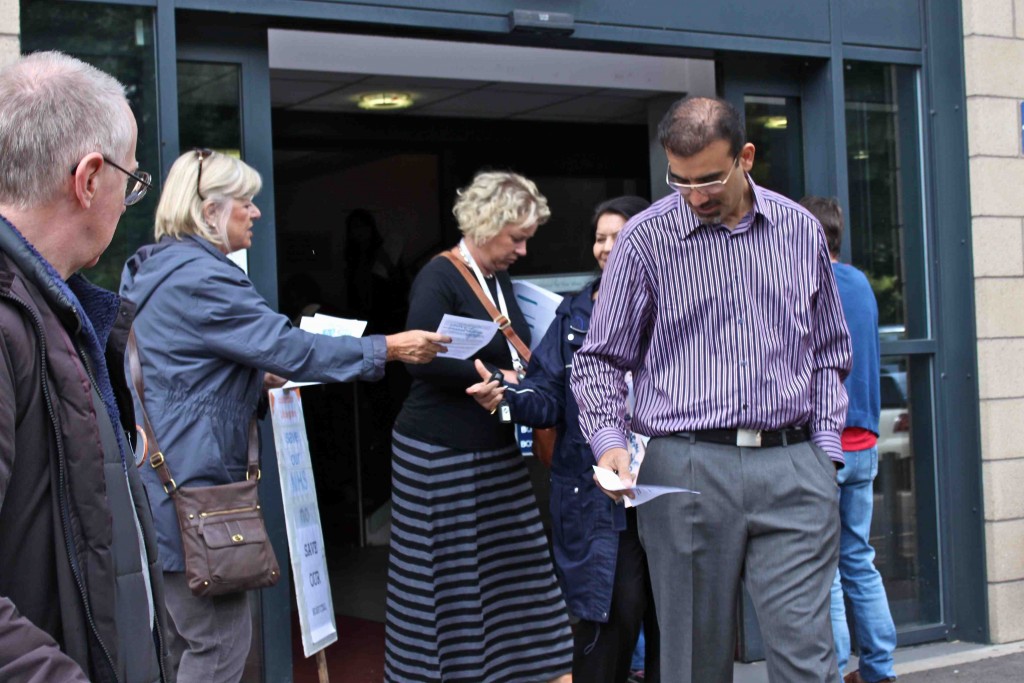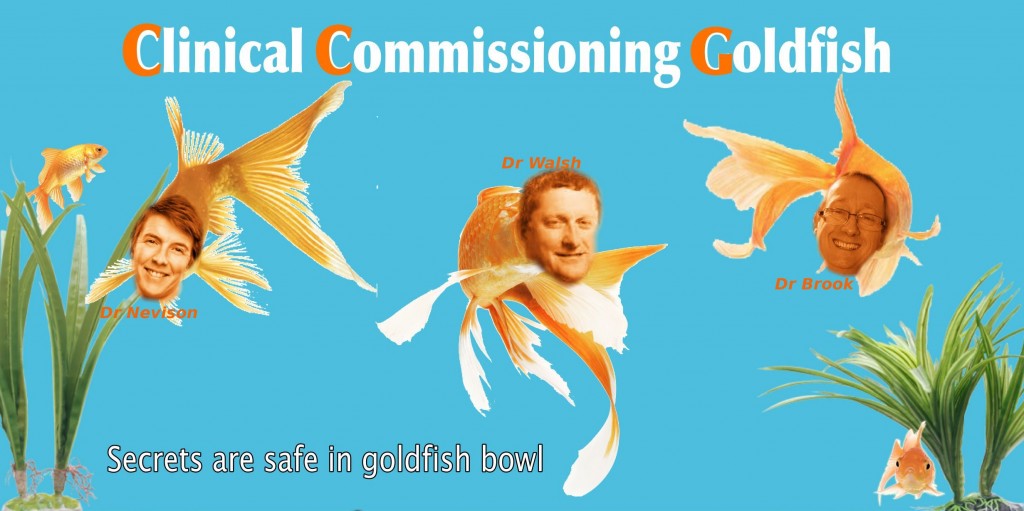“When I use a word,” Humpty Dumpty said in rather a scornful tone, “it means just what I choose it to mean — neither more nor less.”
“The question is,” said Alice, “whether you can make words mean so many different things.”
“The question is,” said Humpty Dumpty, “which is to be master – – that’s all.”
I gained entry to Calderdale Clinical Commissioning Group’s 20th August Stakeholder Engagement Event only after picketing it, along with other members of the general public.
A Councillor Councillor recently told NHS bosses they “should seek a wider basis of opinion about their plans” – instead of confining their “engagement” to “people inside the goldfish bowl.”
So there we were, offering a wider basis of opinion. But would the people inside the goldfish bowl be able to hear us?
Halifax mum Katherine Horner, who was among the picketers, said,
“If the CCG deem their plans to be for the benefit of people of Calderdale and Kirklees, then hold events that are open to the full public. Not a goldfish bowl event where they only invite people from organisations that they have a relationship with and that are supposed to represent us – but don’t really.
As a mum it’s quite simple for me. I want a local fully functioning hospital with all acute and emergency services, not an 87 bed planned care clinic and minor injuries unit.”
The listening event that wasn’t
Penny Woodhead, Calderdale CCG’s Engagement Officer, introduced the invitation-only meeting as a “listening event”, to hear what invited participants thought of the CCG’s two years “engagement work” on the Right Care, Right Time, Right Place proposals for the future of Calderdale NHS and social care services.
She said:
“The event is about listening to stakeholder views in the room.”
So I pointed out that the review of the “engagement” didn’t mention that thousands of people in Calderdale are opposed to the CCG’s proposals.
Calderdale Councillor Janet Battye immediately said that there are no plans or proposals and Calderdale CCG’s Accountable Officer Dr Matt Walsh backed her up. They said the two year “engagement” has been about asking people what they want from healthcare.
When I pointed out that plans for Right Care Right Time Right Place and for Care Closer to Home clearly do exist, Cllr Battye said,
“They are principles, not plans or proposals.”
And Dr Walsh said,
“They are models, not plans.”
Did I feel listened to? No way.
The people who were supposed to be listening gave no consideration to my comment.
Without a moment’s thought, they instantly denied its validity.
They did this by manipulating the meaning of words with the sole aim of establishing “which is to be master” – to quote Alice in Wonderland’s Humpty Dumpty.
However, in the small group I’d been assigned to, invited participants referred repeatedly to the “plan” and “proposal” – even though these supposedly don’t exist.
And Dr Alan Brook, Chair of Calderdale Clinical Commissioning Group, seemed equally off message. He told the whole meeting:
“We have to change hospital services and a major restructuring is underway.”
Having reviewed 72 Calderdale CCG “engagement” documents, Kirklees Healthwatch Durector Rory Deighton announced at the meeting:
“The Care Closer to Home plans are genuinely what people want.”
Widespread lack of understanding of Humpty Dumpties’ proposals
Invited community group representatives at the stakeholder event, who spoke to picketers outside the meeting, said that despite “engagement champion” training, and engagement events with their CCG-approved organisations, many didn’t understand the CCGs’ proposals – or know how they were supposed to explain them to other people.
Roger Shaw, a member of the public who picketed the event and was eventually let in, said,
“The CCG are able to wrap it up in a way that it’s really hard for me to get hold of. They don’t talk about privatisation. It’s all in code. For instance, they talked about joined up public, independent and third sector working.”
The CCG uses “appreciative inquiry” as their “engagement” method. This invites selected groups of people to identify the good qualities of health care that they’ve experienced and then to “dream” about how this could be extended to the whole local NHS and social care system. It doesn’t explain to people what changes the CCG is proposing.
Invited participants went “completely off brief”, with calls to fix what we’ve got now rather than changing the whole NHS and social care system
In a small group roundtable discussion at the stakeholder engagement event, one invited participant said:
“There’s not enough time to inform the public about the proposals – or rather, the model. People want a rationale for why there’s a budget constraint and what would the Care Closer to Home model look like?
The engagement is only reaching out to small parts of the community. We need more time to get the word out to wider people.”
Another invited participant said,
“People want an efficiently run hospital – let’s fix what we’ve got now and see if we still need the changes.”
At this point, Calderdale Clinical Commissioning Group’s (CCG’s) Accountable Officer Matt Walsh said,
“We’re completely off brief.”
A third invited participant carried on regardless:
“You could look at the system and see which bits of the system need changing – rather than changing the whole set up.”
Matt Walsh asked:
“What would it be to work at world class levels of efficiency? Would this mean we don’t need to change the system?”
Lack of evidence for clinical director’s claim that A&Es must merge because small hospitals don’t let consultants maintain clinical skills
Dr Sajid Azeb, Clinical Director of Medicine at Calderdale and Huddersfield NHS Foundation Trust, said that staff shortages among consultants mean that the proposed hospital changes are needed (putting both Calderdale’s and Huddersfield’s acute and emergency services on one site, and all their planned care services on the other).
He said,
“We would struggle to recruit consultants to a 200 thousand population size, because that’s not enough to maintain their clinical skills.”
There was no way of checking the accuracy of this claim in the meeting. But a report by Sally Ruane of the Health Policy Research Unit at DeMontfort University found no reliable evidence of a correlation between the population size of a hospital, patient outcomes and by implication, the consultants’ clinical skills:
“I have been unable to find a clear body of empirical evidence relating to patient outcomes which demonstrates an optimal unit size…The matter is an important one since documents produced by local health organisations for the purpose of consulting the public formally may contain inaccurate and potentially misleading assertions.”
This lack of evidence about an optimal hospital size is borne out by Sir Derek Wanless in his 2007 Report, Our Future Health Secured?
And a study of the relationship between case mix and throughput, and health outcomes for stenting heart patients found no difference between high volume and low volume hospitals. (Heart 2006;92:1667–1672. doi: 10.1136/hrt.2005.086736)
A possible solution to small hospitals’ consultant staffing problems that doesn’t involve cutting and closing hospital services is given in Paul Jenkins’ 2014 article on The future of the small(er) district general hospital (Future Hospital Journal 2014 Vol 1, No 2: 69–71). This suggests that staffing problems could be solved by joint working contracts, so that many consultants appointed to bigger specialist hospitals would be contracted to work sessions at linked smaller District General Hospitals.
“By integrating them into larger health care systems, staff can be shared and rotate between physical locations.”
Invited participants seemed unimpressed by the clinical director’s claim
Responding to Dr Azeb’s assertion, one invited participant said,
“What if we can’t obtain people with the right skills? This is very worrying. We’re running round in circles here. We have to look at things in a different light.”
Matt Walsh said,
“If we create community services it gives head space for hospitals to sort out their staff shortages.”
The invited participant objected,
“If we’re having trouble now to employ staff in Calderdale, we have a problem.”
Dr Azeb countered,
“We have to make it attractive and Right Care Right Time Right Place does that. We have to look at a generic offer. What local access can we have in the community?”
A second invited participant said,
“And how can you attract staff to work in the community if you can’t attract them to the hospital?”
The third invited participant returned to their earlier point:
“Let’s make the existing system work efficiently and then see what needs changing – then it would attract consultants.”
Flawed engagement
Dr Alan Brook described the NHS bosses’ ill-judged public engagement events in the summer of 2014 as a “firefight” over “premature reconfiguration”.
This led the Clinical Commissioning Group to shelve the formal public consultation that had been scheduled for the autumn of 2014.
They then started carrying out what Cllr James has described as “goldfish bowl”, invitation-only engagement events for selected voluntary and community sector groups on their “relationship matrix” list – while they went ahead with planning and setting up the Care Closer to Home scheme.
Dawn Pearson, Engagement Lead at the Commissioning Support Unit, told the stakeholder engagement meeting that since the Summer of 2014, there had been 653 “engagement” responses from:
- 32 focus groups hosted by 13 organisations
- 277 submissions from surveys with groups
- 108 patient opinion postings
But Councillors on the Calderdale and Kirklees Joint Health Scrutiny Committee have said that the design of the engagement questionnaire was flawed, while Cllr Adam Wilkinson told the CCG that their claim that there had been no complaints about their Right Care Right Time Right Place proposals was “untrue”.
This gives reason to doubt the openness and honesty of invitation-only “goldfish bowl” engagement events.
I realised from talking to people who attended the Calder Valley Vanguard engagement event in Todmorden in March 2015 that they came away knowing nothing about the Vanguard scheme – not surprising, given the CCG’s “appreciative inquiry” engagement method that invites people to dream about what they’d like to happen, rather than to rationally consider specific proposals.
Rosemary Hedges, Secretary of Calderdale 38 Degrees NHS Campaign, said:
‘Dedicated campaigners finally forced their way into the inner sanctum of a CCG Engagement with Stakeholders Event which was being held behind closed doors. This was supposed to be an opportunity for the CCG to sell their plans and intentions to community groups, with no input from the ordinary punters who will soon be reaping the disastrous consequences of their privatisation and shrinkage of local health services. So well done for campaigners for getting in and telling them what we really think – not before time.’
Updated 1 September to identify Rory Deighton as Director of Kirklees Healthwatch – not as a representative of Calderdale Healthwatch, as the article mistakenly stated



Rory Deighton works for Healthwatch Kirklees, not Healthwatch Calderdale, Healthwatch Calderdale, he does not work for, or represent, Healthwatch Calderdale. Please correct this inaccuracy
Thanks for fact check. The info pack for the event simply said “Rory Deighton – healthwatch”. Info online seems to say you are both Development Officer for Calderdale Healthwatch and Voluntary Action Calderdale Info and Support Officer (Healthwatch). Is this right? How does that interesting organisational crossover work out? Given that VAC receives funding from Calderdale Clinical Commissioning Group and Calderdale Healthwatch is supposed to keep an eye on behalf of the public on the operations of Calderdale CCG and other NHS organisations in the area?